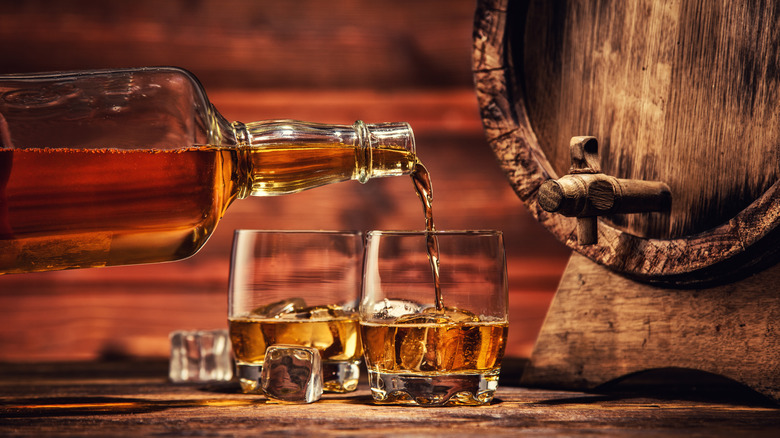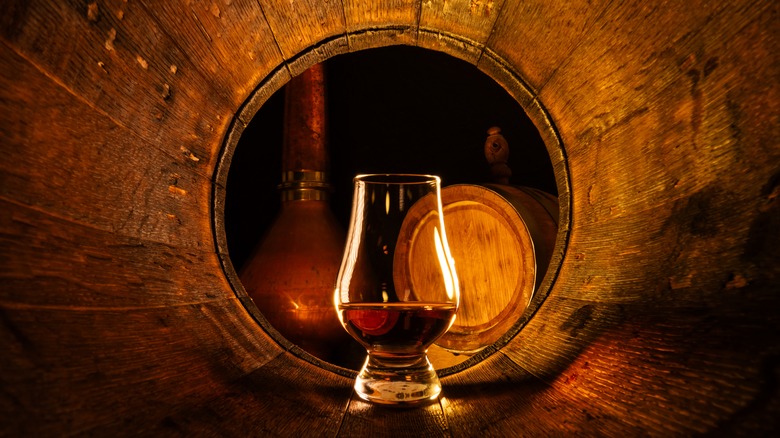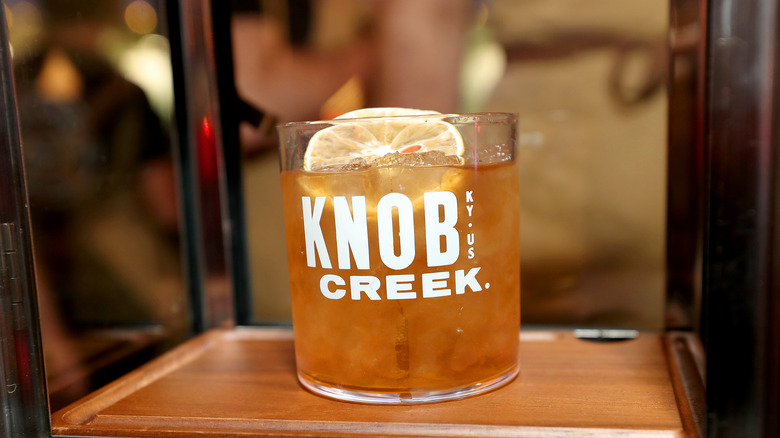What No-Age Statements Mean When It Comes To Whiskey
While many whiskey bottles are happy to advertise how long they've been matured, others have no such label. Older is very often better when it comes to alcohol, but it can also depend on the spirit you're swilling. In the U.S., age statements are voluntary if the spirit has been matured for at least 4 years. There is no requirement to apply an age statement in Europe, but if a producer wants one, the whiskey must have been developed at least 3 years. When including an age statement, the label must reflect the minimum age of development. Sometimes assorted vats are blended, but if a 10-year vintage is bastardized with a batch that's half as old, the producer can't average the two and must indicate it was aged only 5 years.
Because putting an age on the glass is not required, liquor can still be sold with a no-age statement, commonly abbreviated as "NAS." A NAS liquor simply means there is no way of knowing how long it has matured. This allows manufacturers to keep up with high demand, but some admirers of the drink are not enthusiastic about NAS production.
The controversy over NAS liquor
A 15-year-old single malt (obviously) takes 15 years to age. But if demand for a product soars, distributors can't snap their fingers and make additional batches of 15-year-old liquor magically appear. Being able to create NAS liquor gives producers the option to quickly get a product into the hands of consumers, but it can undermine the prestige that comes with aging.
When NAS liquors first hit the market, they were met with skepticism and even snubs from many whiskey connoisseurs. The primary indicator of a quality whiskey for years was how long it had aged. One of the most prominent worries with NAS concoctions is that the body will be underdeveloped. A younger spirit can be brash, and those who know their brown liquors tend to seek out something smoother. Notes of caramel and hints of honey and oak are some flavors associated with a superior experience, which can sometimes get lost with a younger liquor.
Whiskey fans initially saw NAS liquor as a shot-in-the-dark gamble on the grade of their favorite spirit. A liquor with no-age statement printed on the bottle was speculated to be a less quality product. But as more people started trying no-age statement liquors, many warmed up to the concept of NAS beverages, realizing that age isn't everything if other qualities are focused on. Rather than just age, producers of NAS liquors put their attention to other factors that affect quality like flavor, color, and where the liquor is created.
So, does NAS liquor taste good?
Whiskey makers aren't just trying to sell off a sub-par blend to the unknowing. As businesses, putting out a superior product that meets the demands of customers is their first concern. In recent years, many artisans of NAS liquor have been working to master the craft of producing a quality beverage quickly, and in doing so, they have developed the complex flavor profiles that whiskey lovers flock to. Experimenting with different casks and maturation methods, liquor producers are now putting out flavorful brands of NAS spirits that have people changing their tune about the concept. Brands like Johnny Walker and Knob Creek are incredibly successful manufacturers of exceptional NAS whiskey in the U.S. today.
While it's always a safe bet to purchase a bottle that says "aged 15 years," it's not a guarantee that it will be better than a NAS spirit. The debate will rage on for some time regarding whether or not NAS liquor is on par with its age-labeled brethren, but if you're in the liquor store wondering about liquor with a no-age statement attached, don't think of it as a sub-par product. Some of the most popular whiskeys in the world are NAS liquors, and they wouldn't keep selling if they were a lower form of alcohol.


